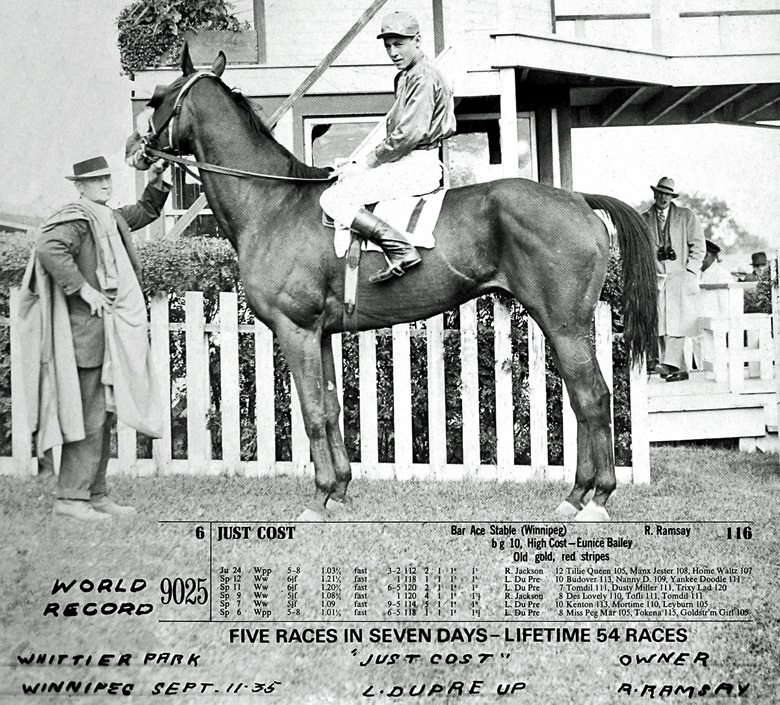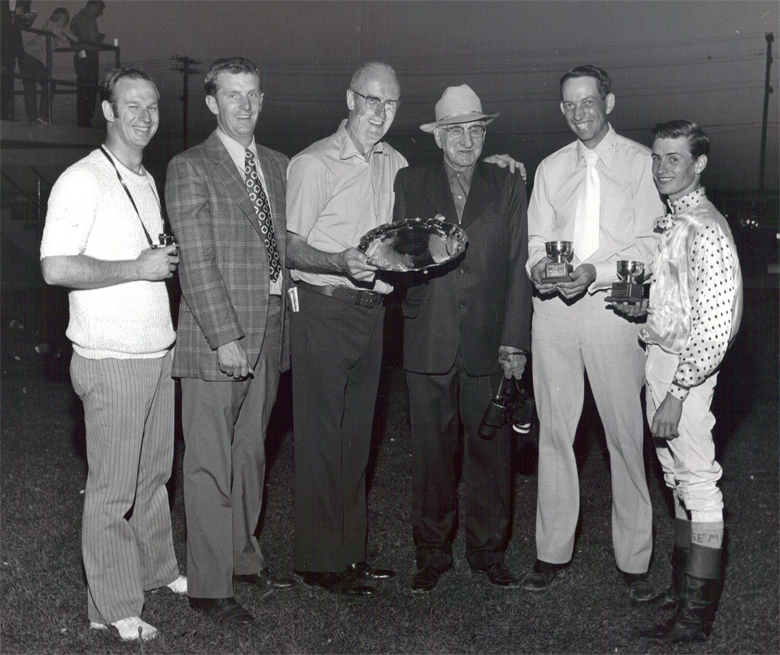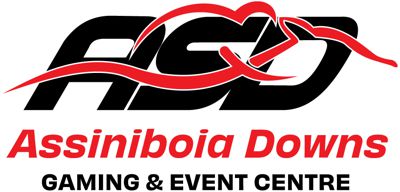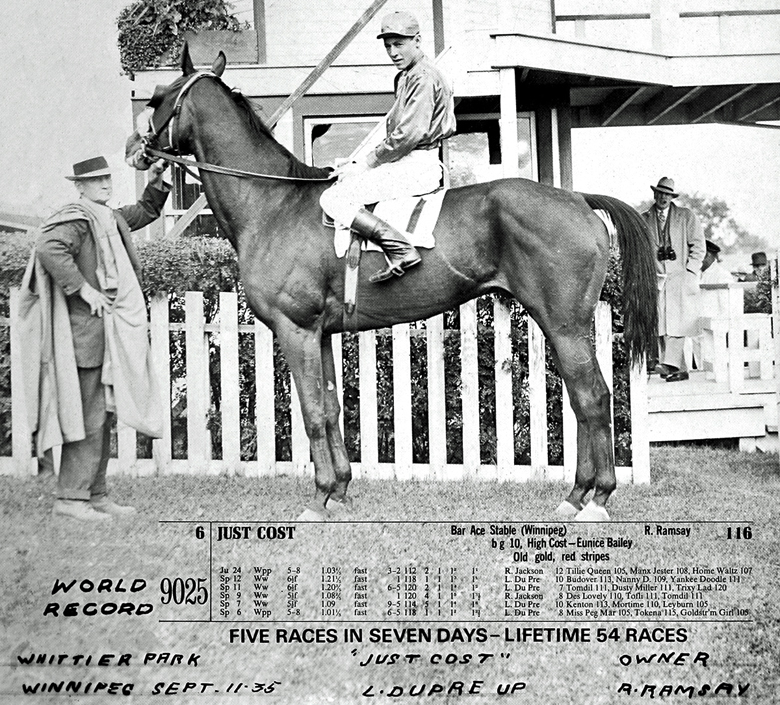
by Bob Gates
To coin a phrase from Charles Dickens’ Great Expectations, “Let’s put the case.” The case, that is, of Just Cost, a thoroughbred runner from the dirty thirties.
Today you are not only readers; you are also the jurists in the case of The People vs Just Cost. Men and women of the jury, I’ll lay out the facts and you decide. Was our accused a villain or a victim?
It’s probably worth mentioning that racing as it existed in the 1930s is difficult to imagine today. Race meets bore a strong resemblance to the wild, wild, west. There were few rules, and enforcement of the rules that existed was not always consistent. Let this be the only charge to you the jury, in the case of Just Cost.
First things first, who was Just Cost?
Denny Layzell prepared the Graded Selections for the Winnipeg Free Press back in the 1950s. Layzell was a knowledgeable guy who knew a lot about the history of racing on the prairies, so I’ll let him introduce the bay gelding we will call “JC.”
In 1953 the following account of Layzell’s appeared in the Free Press:
“Almost 30 years ago, at beautiful Hialeah in Florida, Allan Ramsay purchased the mare Eunice Bailey and mated her with High Cost. He then shipped her to Winnipeg. It was here near the heart of the downtown area that her son, Just Cost was born in 1926 in a stable on Lombard just off Main Street. As a yearling he was acquired by the Bar Ace Stable where he campaigned in the silks of that racing establishment.”
From these humble beginnings JC started out his racing career under the tutelage of trainer Bob Ramsay. Speedy JC was widely known for getting out front. That way nothing could interfere with his chances of winning.
In his first three seasons on the track JC showed little promise and won only two races. In 1931, at the age of five, he blossomed and finished in the money in 12 of his 16 starts. At six he improved on that record, hitting the board in 12 of 14 attempts.
At seven, JC won 10 races, more than any other western bred and good enough for third place among the leading money winners in the west.
In 1934 he had eight victories, again enough to lead the west in races won. He found the finish line first on nine occasions in 1935, sharing the title of most wins in the west with the mighty Joey, the “Toytown Express.”
Again, according to Layzell:
“Yet all the time, Just Cost stayed with the claimers, making no attempts to move up racing’s social ladder. In 31 of his last 44 trips to the post, patrons installed him as favourite.”
The cause for concern arose in 1935. In the span of seven days, JC recorded five, count ’em five, wins! The streak started on Friday, September 6, 1935 at Polo Park and then moved to Whittier Park, where it ran until Thursday, September 12. Truly a remarkable run.
So what was the problem?
In a sincere attempt to clean up racing’s image, the saliva test was introduced for the first time in Winnipeg in the fall of 1935 at the request of the Province. Signs were erected and testing commenced in September at Whittier Park.
It didn’t take long before the following ruling was posted in the horsemen’s room at Whittier Park on Friday, September 13, 1935 — a Friday the 13th that turned out to be unlucky for Bob Ramsay and his horse, Just Cost:
A test of the saliva taken from the horse, Just Cost, racing in the third race, September 9, 1935, having shown that the drug caffeine had been used, trainer Robert Ramsay and the horses Just Cost, Hot Whittier, Leader Boy and Westy’s Tim, in his charge are suspended and the case referred to the Prairie Thoroughbred Breeders’ and Racing Association for further action.
By order of the Stewards.
(Signed) George W. Schilling
Presiding Steward
Winners were tested immediately following the race, but it took several days to complete the analysis of the samples.
Interestingly enough JC had been entered in a race scheduled for Friday, September 13, 1935 at Whittier Park, but “Judge” Schilling’s ruling necessitated his scratch from that race.
Ramsay is believed to be the first trainer “ruled off” in Canada for using a stimulant.

L to R, Wayne, Barry & Bob Anderson, Bob Ramsay, Clayton Gray and Larry Wiseman after winning the 1972 Speers with Doc Kope.
George Washington Schilling met with Ramsay before deciding his fate that fall. He apparently wanted to know if Ramsay had planned on racing through the winter. Ramsay told the Judge that he was taking the winter off. The announced punishment that followed was a nine month ban, which meant that Ramsay would only miss one week of racing in the following spring.
On the other hand, racing’s “Bad Boy” was barred from Canadian racing’s “Red Book” because he had never been registered with the Canada live stock records in Ottawa. What was worse was the dark cloud of suspicion that hung over Just Cost’s life’s performances – all because of his trainer’s illegal activities.
Was that Just Cost’s fault? What choices did he have in the doping scandal of 1935? JC did what he was asked to do and what he loved to do — run races and win!
The little bay gelding’s last race would come when he was 11-years-old on July 7, 1937 in Calgary. It had been a tough year for old JC. He had only hit the board once in four starts.
In his last race he tried what had always worked for him, running up front with the leaders. But despite his best efforts that day, he could not keep up. He gave it his all and probably more than he should have.
The chart caller’s entry said it all, “Just Cost broke down.”
Denny Layzell, the man who knew JC’s story better than most summed it up:
“And so, Just Cost passed from the racing scene to become a children’s saddle pony, leaving behind a record of consistency which will be hard to surpass.”
As for Bob Ramsay, he was born in Grand Point, Manitoba and was in the racing business as owner and trainer of thoroughbreds for more than 60 years. He did some training at the Downs until his 83rd birthday in 1975. Robert James Ramsay died on February 12, 1985 in Winnipeg at the age of 92.
Just Cost’s record of five wins in seven days is believed to be a world record. During his lifetime the veteran of the old Western Prairie Circuit won some 57 races, but was forever remembered for the doping scandal of “35.”
Ladies and gentlemen of our jury, I ask you… Just Cost, villain or victim?
Given racing’s “wild west” reputation back in the day, I suspect the only crime here was the fact that his trainer got caught.
Just Cost was a front-running, little bay gelding with a big heart and through no fault or actions of his own was the recipient of “assistance.” Assistance that he didn’t ask for and may not have even needed, but we’ll never know.
Why? Because he wasn’t given the chance to see if he had sufficient courage to win on his own. So was he really racing’s “Bad Boy?”
I’m pretty sure he would say “Naaaaay!!!”

